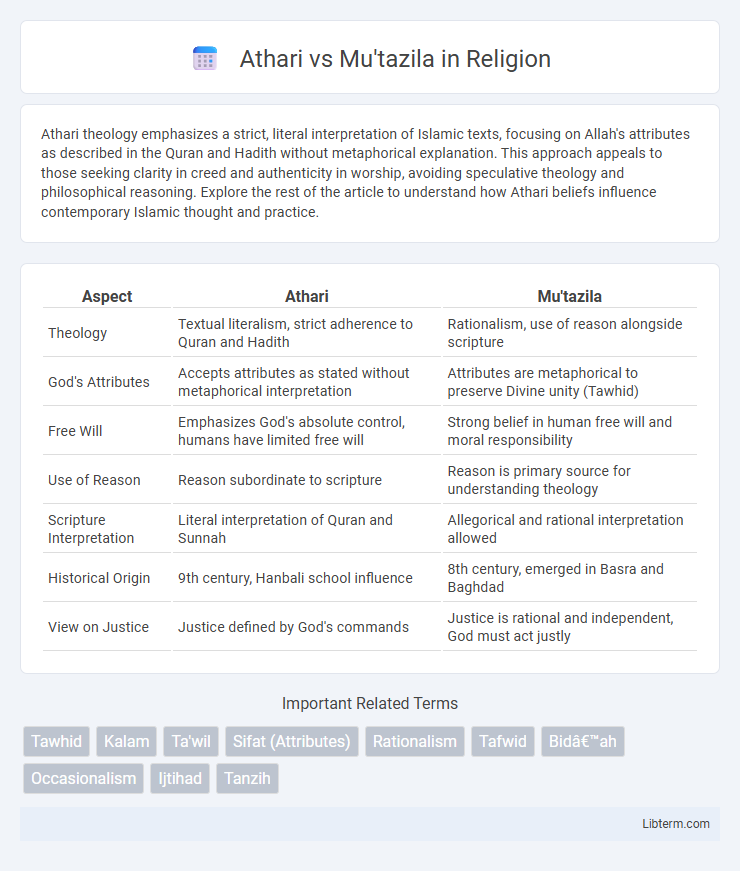Athari theology emphasizes a strict, literal interpretation of Islamic texts, focusing on Allah's attributes as described in the Quran and Hadith without metaphorical explanation. This approach appeals to those seeking clarity in creed and authenticity in worship, avoiding speculative theology and philosophical reasoning. Explore the rest of the article to understand how Athari beliefs influence contemporary Islamic thought and practice.
Table of Comparison
| Aspect | Athari | Mu'tazila |
|---|---|---|
| Theology | Textual literalism, strict adherence to Quran and Hadith | Rationalism, use of reason alongside scripture |
| God's Attributes | Accepts attributes as stated without metaphorical interpretation | Attributes are metaphorical to preserve Divine unity (Tawhid) |
| Free Will | Emphasizes God's absolute control, humans have limited free will | Strong belief in human free will and moral responsibility |
| Use of Reason | Reason subordinate to scripture | Reason is primary source for understanding theology |
| Scripture Interpretation | Literal interpretation of Quran and Sunnah | Allegorical and rational interpretation allowed |
| Historical Origin | 9th century, Hanbali school influence | 8th century, emerged in Basra and Baghdad |
| View on Justice | Justice defined by God's commands | Justice is rational and independent, God must act justly |
Introduction to Athari and Mu'tazila Schools
The Athari school emphasizes strict adherence to the Quran and Hadith, rejecting rationalist interpretations and prioritizing text-based theology in Islamic creed. In contrast, the Mu'tazila school adopts a rationalist approach, using reason and philosophical methods to interpret divine attributes and justice, advocating for free will and divine justice. These foundational differences shape their respective theological frameworks and influence their understanding of key Islamic doctrines.
Historical Origins and Development
The Athari school originated in the early Islamic period, emphasizing strict textualism and literal interpretation of the Qur'an and Hadith, rejecting speculative theology (kalam) to maintain doctrinal purity. The Mu'tazila emerged in the 8th century as a rationalist movement advocating for the use of reason and divine justice, promoting theological principles like the unity of God (tawhid) and human free will. Historically, these contrasting schools shaped Islamic thought through debates on God's attributes, human agency, and scriptural interpretation, influencing Sunni and Shia theological frameworks respectively.
Core Doctrinal Differences
Athari theology emphasizes strict textualism, adhering to the literal meanings of the Quran and Hadith while rejecting rationalist interpretations, and affirms God's attributes without metaphorical interpretation. Mu'tazila advocates for rationalism, stressing divine justice and unity, and interprets God's attributes metaphorically to avoid anthropomorphism. These core doctrinal differences highlight Athari's commitment to traditionalism versus Mu'tazila's emphasis on reason and theological abstraction.
Approach to Qur’an and Hadith Interpretation
Athari scholars emphasize a literal and text-based approach to Qur'an and Hadith interpretation, rejecting metaphorical readings to maintain the apparent meanings of the sacred texts. Mu'tazila theologians advocate for rational analysis and allegorical interpretation, aiming to reconcile scriptural texts with reason and philosophical principles. This fundamental divergence shapes their theological doctrines, with Atharis upholding traditionalist views and Mu'tazilites promoting a rationalist framework.
Theological Debates: Reason vs. Revelation
The Athari school emphasizes strict adherence to the Quran and Sunnah, rejecting rationalist interpretations that transcend literal meanings, while the Mu'tazila champions reason as a vital tool to understand divine revelation and reconcile scriptural texts with rational principles. Central to their theological debates is the nature of God's attributes, where Mu'tazila argues for the unity and justice of God interpreted through reason, whereas Atharis maintain divine attributes as they appear, without allegorical explanation. This discourse reflects the broader tension between faith grounded in revelation and the application of human reason within Islamic theology.
Concepts of Tawhid (Monotheism)
The Athari creed emphasizes a literal and affirmative understanding of Tawhid, asserting God's attributes as they are described in the Quran and Hadith without metaphorical interpretation, thereby preserving His unity and uniqueness. In contrast, the Mu'tazila school employs rationalist methods, interpreting divine attributes metaphorically to maintain God's absolute oneness, denying any multiplicity in His essence or attributes. This fundamental divergence shapes their respective theological approaches, with Atharis prioritizing scriptural fidelity and Mu'tazilites stressing rational coherence in the concept of monotheism.
Views on Divine Attributes
Athari theology emphasizes affirming the divine attributes as they appear in the Quran and Hadith without metaphorical interpretation, maintaining that God's attributes are real and unchangeable. In contrast, Mu'tazila scholars advocate for a metaphorical understanding of divine attributes to preserve God's absolute unity and justice, arguing that attributing human-like qualities to God compromises divine transcendence. This fundamental difference shapes Athari reliance on literalism versus Mu'tazila emphasis on rational interpretation in Islamic theology.
Free Will and Predestination
The Athari school emphasizes absolute predestination, asserting that Allah's will is the ultimate cause of all actions, thereby limiting human free will to mere creation of acts without independent choice. The Mu'tazila advocate for human free will, arguing that individuals possess genuine agency and moral responsibility, enabling them to choose their actions independently of divine predetermination. Central to this debate is the Athari insistence on divine omnipotence versus the Mu'tazila's dedication to justice and accountability through autonomous human choice.
Influence on Islamic Scholarship
Athari theology, emphasizing strict textualism and rejection of rationalist interpretation, deeply influenced traditionalist Islamic scholarship by preserving the primacy of Quran and Hadith in jurisprudence and creed. Mu'tazila, advocating rationalism and divine justice, significantly shaped early Islamic philosophy and theology, encouraging critical inquiry and kalam (theological discourse) in Sunni and Shia thought. The tension between Athari literalism and Mu'tazila rationalism molded the evolution of Islamic scholastic methods, impacting key theological schools like Ash'ari and Maturidi.
Contemporary Relevance and Legacy
The Athari creed's emphasis on literal interpretation and traditionalism appeals to contemporary Salafi movements advocating scriptural purity and rejection of rationalist theology. In contrast, the Mu'tazila's rationalist approach, prioritizing reason and ethical monotheism, influences modernist Muslim thinkers engaged in reform and dialogue with secular philosophy. The enduring legacy of both schools shapes ongoing debates on the relationship between reason and revelation in Islamic theology and jurisprudence.
Athari Infographic

 libterm.com
libterm.com